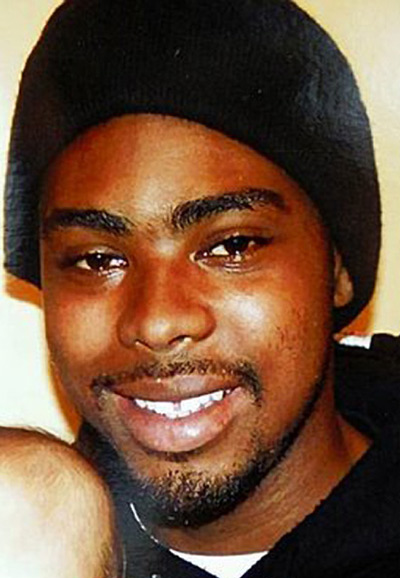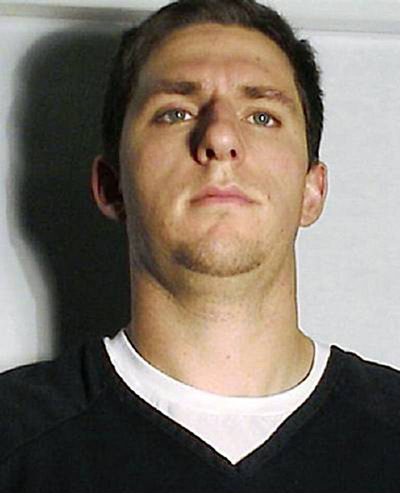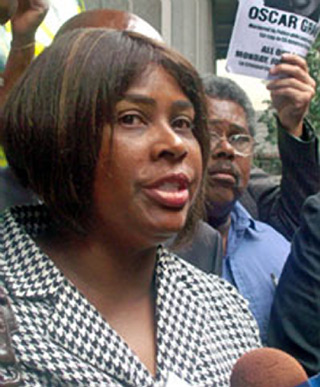
Oscar Grant, the deceased

Johannes Mehserle, the accused killer

Wanda Johnson, the mother
Jevon, the observer
For the first time in California history, a White officer is on trial for murder for the killing of a Black man
Yussuf J. Simmonds
Sentinel Managing Editor
In 2005, the Los Angeles Sentinel ran an editorial titled “THIS IS THE PROBLEM”–The Police Officer’s Bill of Rights (California Law). The editorial went on to state, in part, “According to our investigation, all of the police beatings and shootings, and the lack of justice received by the African American community, in large measure are directly tied to the “policy” that is stipulated under the “Police Officers Bill of Rights” which is also California law. Whenever an incident occurs: a shooting, beating, or any violation of a Black person’s rights at the hands of a police officer, the threshold of protection for the police officer appears to supercede the fundamental rights and protection of Black citizens/victims. Everything that is done thereafter is about protecting the rights of the police.
The trial of Officer Johannes Mehserle who shot and killed Oscar Grant on New Year’s Day 2009, is like a blast from the–not too distant–past. Grant was the Black victim; Mehserle is the White Officer who worked for the Bay Area Rapid Transit (BART) and is on trial for murder, the first such case in California history. Though there may be a disagreement as to whether a BART officer is actually a police officer within the context or is covered under the Police Officers Bill of Rights–Government Code Section 3300–3311, the Peace Officers Association of California is paying for Mehserle’s legal defense.
Fact: Oscar Grant is dead; Johannes Mehserle is alive and on trial for killing Grant.
Fact: Officer Mehserle shot Oscar Grant in the back.
Fact: The events were captured on multiple digital and cell phone cameras.
Fact: The footage was disseminated to media outlets and to various websites, where it was watched hundreds of thousands of times.
Fact: After the incident was broadcasted, there were days of both peaceful and violent protests in Oakland.
Fact: The trial was moved to Los Angeles to avoid the expected adverse publicity that accompanied the shooting and is accompanying the trial.
Fact: Like the trial in Simi Valley of the four officers who beat Rodney King, there are no Blacks on the jury.
It is also instructive to remember that prosecutors have often used “consciousness of guilt” to buttress their case whenever a suspect flees the jurisdiction prior to arrest. It was prominently articulated in the opening statement for the defense by famed Attorney Leo Branton in the Angela Davis trial. After the shooting of Grant, Mehserle fled to the jurisdiction and was located in Nevada, and was brought back to Alameda County to be charged.
The highlight of the trial has been the officer’s testimony that he made a mistake: mistakenly drawing his gun instead of his taser, and shooting Grant in the back. According to Sentinel’s sources, Grant was shot while he was laying on his stomach. During Mehserle’s testimony, the duration of taser training was an issue and it came out that BART officers only receive less than a month of taser training. No focus seemed to be placed on the quality or the duration of firearms training.
However, it was learned that Mehserle’s gun was on his right side supposedly fastened to prevent easy or accidental release and his taser was on his left side with no fastener–just in its pouch/holder. Under those circumstances, it would be reasonable to conclude that Mehserle was right-handed because his gun was holstered for a right-hand draw. So it seems like a stretch to accept that the officer mistakenly drew his gun (on the right side) instead of his taser (on the left side) when they were on opposite sides of his body. The taser was easily accessible and the gun was not or should not have been. The gun was supposed to be holstered and fastened. If that was not the status of the gun and the holster, then Mehserle may have unfastened it, intending to use it.
The trial is coming to an end this week; both the prosecution and the defense are poised to give their closing statements, and shortly afterwards the jury is expected to get the case for deliberation.
How the jury interprets the evidence–especially the pictures and the videos–will have a lot to do with their life experiences. The case is a high profile and polarizing event, and much of society only focuses on the criminal justice system when such a trial is underway; in fact, what most of “us” know about the criminal justice system is what is shown in movies or on television, or what “we” are caught up in the system–by that time, the learning curve is real life experience.
The family of both sides also suffers tremendously during this kind of a trial. But the deceased’s family suffers along with having to bear the loss of a loved one. During one of the news conferences held Wanda Johnson, the mother of Oscar Grant said, “What I saw that was heart wrenching to me was my son taking that picture, letting us know, letting me know, ‘Mama. I wasn’t doing anything. I wasn’t doing anything wrong!”
And after Johnson saw Mehserle’s testifying, she said, “The officer who killed my son was crying on the witness stand but his tears did not seem to be real. It was more like he was seeking sympathy from the jurors.” She then continued, “And the judge was sympathetic and offered him cool water to help console his tears. When members of my family and friends cried inside the courtroom, expressing our emotions for the loss of my son, the judge called for an immediate recess so that the jury would not be influenced by our emotions.”
The Sentinel asked Attorney Earl C. Broady, Jr., a prominent criminal attorney and a former deputy sheriff for his comments on the trial and he said, “I’ve learned from various sources that this guy was shot in the back–the victim was–and in my opinion, that’s reprehensible conduct; there’s no justification to shoot a person in the back, especially young kid … that young man was a teenager, wasn’t he? Hopefully, justice will prevail. Based on what I’ve heard, I think this man (the ex-BART officer) should be held accountable for his mis-conduct.”
Jevon, a young Black man from Oakland who was at the Criminal Courts Building to observe the trial, said, “We knew the officer was lying and crying on the witness stand to save his own life. The hypocrisy he demonstrated was alarming. The defendant is trying his best to gain a not-guilty verdict and police officers in Oakland are bracing themselves for the outcome. They are also surely aware that the Oakland community is demanding justice for Oscar Grant and will not accept anything other than a guilty verdict.”
Whatever verdict the jury renders, this will not be the end because the Johnson/Grant family has a retained an attorney for a wrongful death lawsuit.
Â






